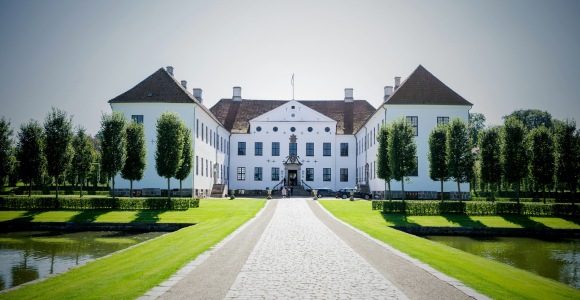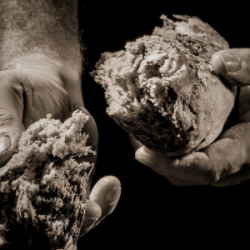
These words give us much to think about. Robinson evaluates Jesus’ teachings by what happens in the early church when Christians tried to put them into practice. Notice the result: “There were no needy persons among them.” The early Jesus movement had accomplished the goal of these ancient stories: they eliminated poverty in their midst.
Welcome Readers! Please subscribe to Social Jesus Here.
This is Part 3 of The Moral Dilemma and Challenge of Wealth
(Read this series from its beginning here.)
“All the believers were one in heart and mind. No one claimed that any of their possessions was their own, but they shared everything they had. With great power the apostles continued to testify to the resurrection of the Lord Jesus. And God’s grace was so powerfully at work in them all that there were no needy persons among them. For from time to time those who owned land or houses sold them, brought the money from the sales and put it at the apostles’ feet, and it was distributed to anyone who had need.” (Acts 4:32-35)
Over and over again in the gospels, Jesus places hoarding one’s wealth in tension with sharing it with others:
“No one can serve two masters. Either you will hate the one and love the other, or you will be devoted to the one and despise the other. You cannot serve both God and money. (Matthew 6:24)
“No one can serve two masters. Either you will hate the one and love the other, or you will be devoted to the one and despise the other. You cannot serve both God and money.” (Luke 16:13)
Being “rich toward God” doesn’t mean giving all your money to religious institutions. It means using your means to mitigate the suffering of the others with whom we share this world as our home. We live in a system today that creates both wealth and poverty. As that economic system continues, the gap between the two classes continues to expand. Wealth, when viewed through the lens of compassion and responsibility, can be very powerfully shared for advancing human dignity and well-being. In a world where inequality continues to deepen and many struggle to meet basic needs, those who have access to financial resources are uniquely called to be agents of healing and justice. Using wealth to help others is not just an act of charity—it is a moral imperative that affirms our shared humanity.
At its best, wealth can serve as a bridge between abundance and need. It can fund education for children who might otherwise go without schooling, provide clean water for communities where it is scarce, support healthcare systems, build affordable housing, and sustain efforts to address climate change and systemic poverty. These are not merely abstract goals; they represent real lives changed, futures made possible, and hope restored.
And using wealth for the good of others requires more than good intentions—it also calls for intentionality, humility, and equity. True generosity listens before it gives. It involves understanding the needs of communities rather than imposing one-size-fits-all solutions. It resists the temptation to give in ways that perpetuate or preserve power imbalances. Instead, it seeks to empower, to lift up, and to restore dignity.
Faith traditions, moral philosophies, and humanitarian values all speak to the sacred responsibility that comes with wealth. Jesus taught that to love one’s neighbor means to meet their needs—not out of guilt, or duty, but out of genuine care. The Hebrew prophets cried out for justice, not just charity. Across cultures, the wise and ethical have consistently called upon those with means to see their wealth not as an end in itself, but as a resource for the greater good.
In practical terms, this might mean supporting local organizations doing transformative work, investing in sustainable enterprises that uplift communities, or simply being present and generous in the lives of neighbors, friends, and strangers. It also includes advocating for fairer systems that redistribute opportunity and reduce barriers.
In the end, wealth is not measured by how much we can accumulate, but by how much good it enables in our lives and others’. This is what it may mean to be rich toward God. It means being rich toward our fellow humans. When we use what we have to love, to serve, and to repair the world around us, we step into a deeper purpose—one that honors both the giver and the receiver.
Are you receiving all of RHM’s free resources each week?
Begin each day being inspired toward love, compassion, justice and action. Free.
Sign up at HERE.













